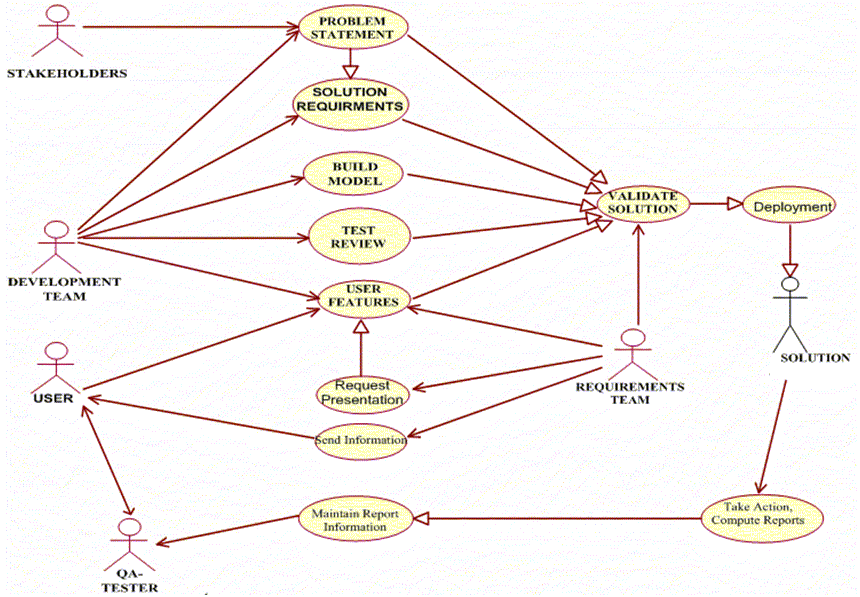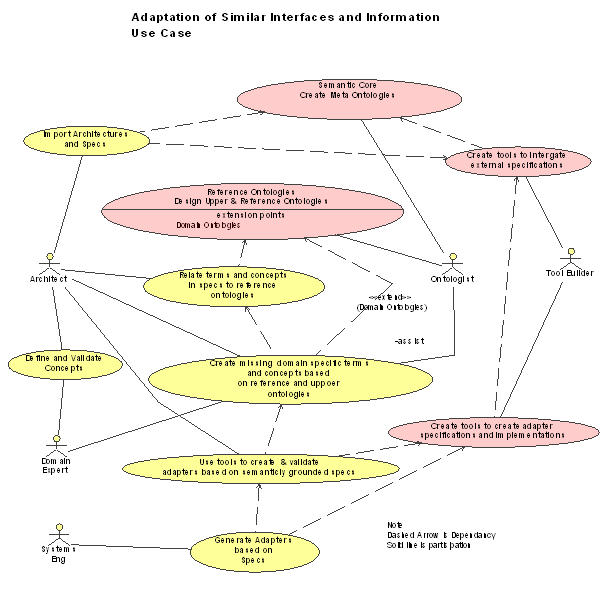Dear Cory, (01) 1) Yes. I strongly agree. (02) I have adapted a use-case from my work while reviewing the original text at http://colab.cim3.net/cgi-bin/wiki.pl?OntologyTaxonomyCoordinatingWG --- I have not interpreted the preceeding www accurately (and will look at an update) but am supporting the path forward using Cory's approach (i) Engineered artifacts like Use Cases and (ii) Embedding a process or workflow oriented path forward (iii) that we figure out what the final outcome would look like together. (03) My intention is to facilitate and to help, so the use case I wrote was designed abstractly to support Cory's (while trying to map into the intent as I understood it from http://colab.cim3.net/cgi-bin/wiki.pl?CosmoWG ) , hence "each actor" in your use case would co-interoperate in the Process use case. It means that our largest gap is the "Stakeholders" category --- I think it is still ill-defined (perhaps I am just not informed) --- we need to get a bird's eye view from the folks that want to implement, to the folks that want to theorize, to the folks that want to utilize the end results. (04) Notes to my diagram: User Features (ie. what feature would users like to see in the solution --- ex. inter-operability as one feature might translate to committment to a standard like Common Logic). In the case of the many ontologies that are suggested, the "User", "QA-Tester", the "Solution" (ie. Tool or Method or Ontology), would need to be documented beyond an inventoried listing -I believe it needs a deeper use-case than what I have presented in support of Cory's use-case "Tool Builder" --- for example, in a cooking recipe book, we never see just ingredients that go into the dish (which presupposes that everyone "knows" what the ingredient is and where it goes) but the intended manipulations in order to create the dish and their origin (so, domain ontologies must have operational semantics beyond classification structures that need to somehow be annotated) --- hence, a notion of "provenance" or "pedigree". (05) So, I strongly support your initiative and will do whatever I can to help you succeed along this type of path forward. I invite you to communicate with me offline for low level details or discussion as well at your convenience as some issues (like what UML tool you are using so we can synch up --- this may not be the most useful basis for bandwidth consumption on this list). (06) 2) Yes, again, I strongly agree. I would like to second support to this scenario and explore it in detail further. I am on a tight deadline on another matter, but, will return to it in a couple of days because I *strongly* support the application of use-cases (as you have done) seperate to text-only communications. (07) My early and perhaps premature comment, is that we have think about what/who/how "Tool Builder" does/is/basis or provenance of methods (and I imagine the different methods will be needed) and suggest for considertation the use of Common Logic as formal means to document and support content wihtin the use-case rubric (as per Cory's inititiative herein). I suggest to all that we have a look at ISO COMMON LOGIC as a potentially useful notational framework within a UML process. (08) I hope my notes are helpful for as a starting point for constructive critique or moving things forward. (09) Thanks, (010) Arun (011) Cory Casanave wrote: (012) >Great, >So 2 questions at 2 levels; >1) Would a set of this KIND OF use case scenarios, validated by the group, >make sense as a way to establish the requirements for upper/reference/meta >Ontologies and related work? >2) Does this particular scenario make sense as something we would like to >support? >Regards, >Cory Casanave > >-----Original Message----- >From: OS-ERA-bounces@xxxxxxxxxxxxxx [mailto:OS-ERA-bounces@xxxxxxxxxxxxxx] >On Behalf Of Arun Majumdar >Sent: Monday, January 02, 2006 5:59 PM >To: ONTAC-WG General Discussion >Cc: SemanticCore@xxxxxxxxxxxxxxx; OS-ERA@xxxxxxxxxxxxxx >Subject: Re: [OS-ERA] [ontac-forum] Re: Future directionsfor ontologiesand >terminologies > >Dear Cory, > >This is *exactly* what I was looking for - wonderful. Thank you very >kindly for this. > >Happy New Year, > >Arun > >Cory Casanave wrote: > > > >>Arun, >> >>I updated the document with a use case (also enclosed), see if that >>makes it any more clear. >> >>-Cory >> >>*Figure *1 >> >> >> >>-----Original Message----- >>From: ontac-forum-bounces@xxxxxxxxxxxxxx >>[mailto:ontac-forum-bounces@xxxxxxxxxxxxxx] On Behalf Of Arun Majumdar >>Sent: Saturday, December 31, 2005 1:05 AM >>To: ONTAC-WG General Discussion >>Subject: Re: [ontac-forum] Re: Future directions for ontologiesand >>terminologies >> >> >> >>Dear Cory, >> >> >> >>I reviewed your paper and liked it. Do you have a process flowchart or >> >>diagram that summarizes the ideas as a picture might help us modularize >> >>and iterate the sub-processes required? However, I like the overall >> >>gist and this might be usable in developing a "methodology", even >> >>without any diagrams. >> >> >> >>Thanks, >> >> >> >>Arun >> >> >> >>Cory Casanave wrote: >> >> >> >> >> >>>Re: How will ontologies help with legacy systems maintenance? >>> >>> >>>Legacy evolution and integration is what I was addressing here... >>> >>> >>>http://www.semanticcore.org/requirements/InterfaceAdaptation.pdf >>> >>> >>>-----Original Message----- >>> >>> >>>From: ontac-forum-bounces@xxxxxxxxxxxxxx >>> >>> >>>[mailto:ontac-forum-bounces@xxxxxxxxxxxxxx] On Behalf Of David Eddy >>> >>> >>>Sent: Friday, December 30, 2005 11:36 PM >>> >>> >>>To: ontac-forum@xxxxxxxxxxxxxx >>> >>> >>>Subject: [ontac-forum] Re: Future directions for ontologies and >>> >>> >>>terminologies >>> >>> >>>John Sowa - >>> >>> >>>BEFORE reading the 5 additional waiting digests in my in-box, I'm going >>> >>> >>>to come out of lurk mode & throw my two cents on the table--at the >>> >>> >>>extremem opposite end of the table from John Sowa I think--as to what I >>> >>> >>>think could be a valuable contribution from this group... >>> >>> >>>>CC> A valuable task for this group would be to collect and >>>> >>>> >>>>>validate user driven requirements as well as the scenario >>>>> >>>>> >>>>>of applying an upper ontology to those solutions. This >>>>> >>>>> >>>>>will help nail down the set of problems we are addressing >>>>> >>>>> >>>> >>>> >>>> >>>Maybe the phrase "rip & replace is NOT an option..." is old news, but >>> >>> >>>the first time I heard it at Mitre gig in McLean in September 2004 >>> >>> >>><http://www.topquadrant.com/conferences/sept8_2004/stgov04.htm> from >>> >>> >>>Mike Daconta, it really grabbed my attention. >>> >>> >>>For a variety of reasons I'll claim that I look at the world thru the >>> >>> >>>very foggy & scratched glasses--very much the opposite of "rose >>> >>> >>>colored"--of a maintenance programmer. Pick your legacy language... >>> >>> >>>COBOL, Fortran, PL/S, Algol, Java, Ruby, PHP,... >>> >>> >>>I've had a wonderful time in my career BUILDING systems... guess what? >>> >>> >>>The green fields are all built up now. While it may be feasible to put >>> >>> >>>$13 billion into the rats hole of Boston's "Big Dig" (thank you very >>> >>> >>>much taxpayers of America), such massive reconstruction efforts are NOT >>> >>> >>>likely to happen to the software infrastructure we've built over the >>> >>> >>>past 50+ years. >>> >>> >>>The challenge going forward is getting those crusty old legacy >>> >>> >>>systems--that WORK--to talk with other systems. >>> >>> >>>And that's where taxonomy, ontology & semantics comes in... not 1 in >>> >>> >>>100,000 of the systems that our daily lives depend on has been either >>> >>> >>>conceived, designed, built, and certainly not maintained with a >>> >>> >>>nanosecond of thought towards the organizational principles in formal >>> >>> >>>ontologies. >>> >>> >>>Said another way... if you can distill ANY semantics from MSTR-MENSA-FL >>> >>> >>>with RDF, predicate calculus, KIF, or any other formal logic process, >>> >>> >>>I'm all ears. >>> >>> >>>I recently discovered this interesting article by Dr George (Mr WordNet) >>> >>> >>>Miller... >>> >>> >>><http://www.kurzweilai.net/meme/frame.html?main=/articles/art0186.html> >>> >>> >>>... take a simple 13 word sentence & it provides some 3.6 Trillion >>> >>> >>>combinations. As he points out... no wonder "machine translation" has >>> >>> >>>had such a hard time living up to it's dreams. >>> >>> >>>And as far as I can tell the WordNet effort primarily only deals in real >>> >>> >>>words. >>> >>> >>>News flash... inside software applications "real words" are few & far >>> >>> >>>between. >>> >>> >>>What I want out of this ontological discourse is something that helps >>> >>> >>>systems analysts & programmers to more quickly UNDERSTAND what the >>> >>> >>>systems under their care are actually talking about. >>> >>> >>>Bluntly... I've heard this fundamental challenge/conundrum throw up in >>> >>> >>>the SOA (service oriented architecture) commercial space... >>> >>> >>>The business problem: I'm in an insurance company that has several >>> >>> >>>thousand applications (a universe of undefined extent comprised of >>> >>> >>>custom built applications, heavily customized packages & box-stock >>> >>> >>>packages...) >>> >>> >>>[FYI... there was a recent blurb in WashingtonTechnology... >>> >>> >>>"EA helps mind the money >>> >>> >>>By Drew Robb >>> >>> >>>11/07/05; Vol. 20, No. 22 Intelligence is an imperfect science. Just ask >>> >>> >>>CIA or the 9/11 Commission. Or EDS Corp., the contractor tasked with >>> >>> >>>wrangling thousands of legacy systems into the Navy-Marine Corps >>> >>> >>>Intranet. When EDS started the job, the Navy thought it had about 5,000 >>> >>> >>>applications to integrate. EDS found more than 100,000."] >>> >>> >>>If I'm in Silo A & know what "policy number" represents, how do I know >>> >>> >>>that over in Silo B, I need to be looking for "contract ID"? >>> >>> >>>[This is an extremely simplified example... this basic problem caught my >>> >>> >>>attention 25 years ago at an insurance company that had discovered some >>> >>> >>>70 names for the core "policy number" concept... I doubt if that number >>> >>> >>>has gotten smaller in the past 25 years.] >>> >>> >>>Sorry to be so long winded... but I vote with Denise Bedford... >>> >>> >>>"metadata is NOT hierarchical." And the corollary... software systems >>> >>> >>>are NOT inherently organized. >>> >>> >>>How will ontologies help with legacy systems maintenance? >>> >>> >>>_____________________ >>> >>> >>>- David Eddy >>> >>> >>>Babson Park, MA >>> >>> >>>781-455-0949 >>> >>> >>>_________________________________________________________________ >>> >>> >>>Message Archives: http://colab.cim3.net/forum/ontac-forum/ >>> >>> >>>To Post: mailto:ontac-forum@xxxxxxxxxxxxxx >>> >>> >>>Subscribe/Unsubscribe/Config: >>> >>> >>>http://colab.cim3.net/mailman/listinfo/ontac-forum/ >>> >>> >>>Shared Files: http://colab.cim3.net/file/work/SICoP/ontac/ >>> >>> >>>Community Wiki: >>> >>> >>>http://colab.cim3.net/cgi-bin/wiki.pl?SICoP/OntologyTaxonomyCoordinatingWG >>> >>> >>>_________________________________________________________________ >>> >>> >>>Message Archives: http://colab.cim3.net/forum/ontac-forum/ >>> >>> >>>To Post: mailto:ontac-forum@xxxxxxxxxxxxxx >>> >>> >>>Subscribe/Unsubscribe/Config: >>> >>> >>http://colab.cim3.net/mailman/listinfo/ontac-forum/ >> >> >> >>>Shared Files: http://colab.cim3.net/file/work/SICoP/ontac/ >>> >>> >>>Community Wiki: >>> >>> >>http://colab.cim3.net/cgi-bin/wiki.pl?SICoP/OntologyTaxonomyCoordinatingWG >> >> >> >> >> >> >> >>_________________________________________________________________ >> >>Message Archives: http://colab.cim3.net/forum/ontac-forum/ >> >>To Post: mailto:ontac-forum@xxxxxxxxxxxxxx >> >>Subscribe/Unsubscribe/Config: >>http://colab.cim3.net/mailman/listinfo/ontac-forum/ >> >>Shared Files: http://colab.cim3.net/file/work/SICoP/ontac/ >> >>Community Wiki: >>http://colab.cim3.net/cgi-bin/wiki.pl?SICoP/OntologyTaxonomyCoordinatingWG >> >>------------------------------------------------------------------------ >> >> >>_________________________________________________________________ >>Message Archives: http://colab.cim3.net/forum/ontac-forum/ >>To Post: mailto:ontac-forum@xxxxxxxxxxxxxx >>Subscribe/Unsubscribe/Config: >> >> >http://colab.cim3.net/mailman/listinfo/ontac-forum/ > > >>Shared Files: http://colab.cim3.net/file/work/SICoP/ontac/ >>Community Wiki: >> >> >http://colab.cim3.net/cgi-bin/wiki.pl?SICoP/OntologyTaxonomyCoordinatingWG > > >> >> >> >> > > >_______________________________________________ >OS-ERA mailing list >OS-ERA@xxxxxxxxxxxxxx >http://tethersend.com/mailman/listinfo/os-era_tethersend.com > > > > > (013) _________________________________________________________________ Message Archives: http://colab.cim3.net/forum/ontac-forum/ To Post: mailto:ontac-forum@xxxxxxxxxxxxxx Subscribe/Unsubscribe/Config: http://colab.cim3.net/mailman/listinfo/ontac-forum/ Shared Files: http://colab.cim3.net/file/work/SICoP/ontac/ Community Wiki: http://colab.cim3.net/cgi-bin/wiki.pl?SICoP/OntologyTaxonomyCoordinatingWG (01) |

